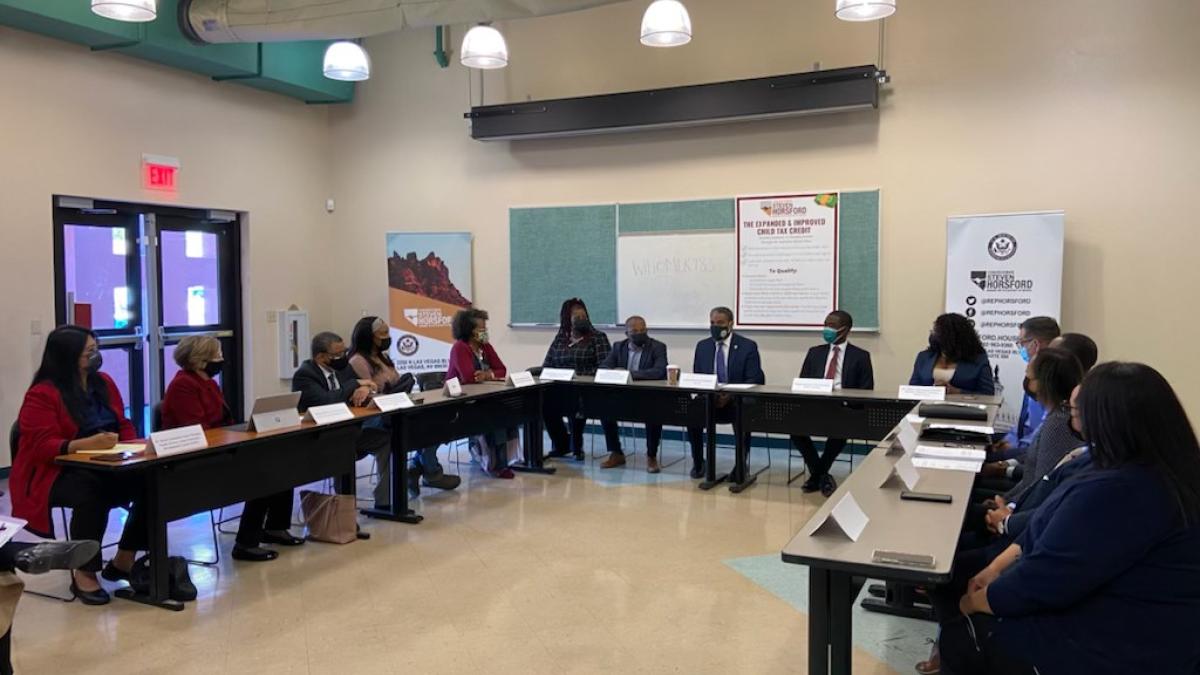Deputy Treasury Secretary Adeyemo and Congressman Horsford Hold Listening Session with Families and Community Leaders in Nevada’s Fourth District

NORTH LAS VEGAS, NEV. — Today, Congressman Steven Horsford (D-NV-04) and Deputy Treasury Secretary Wally Adeyemo held a listening session to hear from families and community leaders in Nevada's Fourth District about the impact of the expanded Child Tax Credit and the urgency of extending this key tax cut for middle-class families through the Build Back Better Act. With input from representatives of the CARES Housing Assistance Program (CHAP), the conversation also touched on the importance of investing in affordable housing and preventing eviction as housing prices in Southern Nevada continue to rise.
"In Nevada's Fourth District and across the country, the expanded Child Tax Credit is changing the lives of millions of families for the better. During today's listening session, I was glad to speak with local families and community leaders about how the federal government can strengthen the Child Tax Credit and make key progress in other vital areas, including housing affordability," said Congressman Steven Horsford. "As we work to extend the Child Tax Credit for another year and lower housing costs through the Build Back Better Act, I'm grateful to Deputy Secretary Adeyemo for joining me to make sure Nevada families have a voice in our nation's economic recovery."
"In November, more than 353,000 Nevada families, including 595,000 children, received the monthly Child Tax Credit. This tax relief has made a positive impact on the lives of working families who have been able to use it to cover costs for food, childcare, and other household needs," said Deputy Secretary Wally Adeyemo. "It was great to hear directly from families in Las Vegas on how they're benefitting from the CTC and why it's so important to extend the relief through 2022 and make it permanently fully refundable through the Build Back Better Act."
To watch a livestream of the event, click here.
Background on the Expanded Child Tax Credit:
In March 2021, Congressman Horsford voted to pass the American Rescue Plan, which temporarily increased the Child Tax Credit to $3,000 - $3,600 per child for tax year 2021, with half of the credit advanced through monthly payments. From July through December, most families are eligible to receive monthly payments of $250 - $300 per child.
Researchers at the Columbia University Center on Poverty and Social Policy estimate that the Child Tax Credit and other COVID-19 relief measures could cut child poverty in half, with an outsized effect on the well-being of rural children and Black and Latino children. Earlier this month, Congressman Horsford voted to pass the Build Back Better Act, which would extend the increased Child Tax Credit through 2022.
The Congressional Joint Economic Committee has estimated that 167,000 children in Nevada's Fourth District qualified for 92,000 Child Tax Credit payments in November, totaling more than $43 million that month alone. Researchers have found when families with young children see their income rise, their children see long-term benefits in the form of increased earnings as adults.
Impact of the Child Tax Credit in Nevada's Fourth District:
- 97 percent of households in Nevada's Fourth District are eligible to benefit from the expanded and improved Child Tax Credit
- The expanded and improved Child Tax Credit is lifting 9,700 children in Nevada's Fourth District out of poverty
- Because of the larger benefit for the youngest children, the expanded and improved Child Tax Credit is lifting 3,400 children under the age of six out of poverty
- Families with children in poverty receive $5,200 on average
- The expanded and improved Child Tax Credit is lifting 3,400 children in Nevada's Fourth District out of deep poverty
- Statewide, the American Rescue Plan's Child Tax Credit expansion will deliver significant benefits to children in rural areas. According to the Center for Budget and Policy Priorities, 95 percent of rural Nevada children will benefit from the expansion, compared to 92 percent of Nevada children in metro areas.
Background on Housing Investments in the American Rescue Plan and the Build Back Better Act:
Over the last year, home rental prices in Southern Nevada have soared more than 20 percent, even as the region struggles to rebound from the economic damage of the pandemic. As part of the American Rescue Plan, Congressman Horsford voted to pass $21 billion in federal rental assistance to help housing providers who work with their tenants to avoid eviction. Since the beginning of the pandemic, Congress has passed a total of $46 billion in housing aid.
Since before the expiration of the federal eviction moratorium in July, Congressman Horsford has pushed local authorities to get rental assistance to tenants and housing providers in a timely and efficient manner. To learn more about rental assistance programs in Nevada, click here.
The Build Back Better Act includes more than $150 billion in additional housing investments, which will create or preserve more than one million homes that are affordable and accessible to families in need. This funding includes:
- $65 billion to address long overdue repairs and rebuild our nation's public housing to be more climate resilient and energy efficient
- $24 billion for new Housing Choice Vouchers to support families struggling to afford their rent and help people escape homelessness and domestic violence
- $26 billion to create and preserve affordable and accessible housing to address the nation's housing shortage
- $10 billion in down payment assistance to make the dream of homeownership possible for the millions of mortgage-ready first-generation homebuyers
